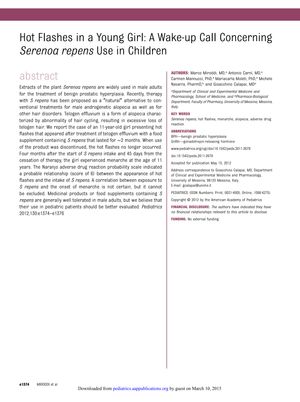TLDR Serenoa repens (saw palmetto) may cause side effects like hot flashes in children and needs more research for safety in pediatric use.
The document described the case of an 11-year-old girl who developed hot flashes after taking a food supplement containing Serenoa repens (S repens) to treat telogen effluvium. The hot flashes stopped when the supplement was discontinued. The girl also experienced her first menstrual period with abnormal duration and volume of blood loss four months after starting S repens and 45 days after stopping it. Using the Naranjo adverse drug reaction probability scale, a probable relationship between the hot flashes and S repens intake was determined with a score of 6. Although a direct correlation between S repens use and the onset of menarche was not confirmed, it was not ruled out. The authors concluded that while S repens is usually well tolerated in adult males, its effects on children, particularly for unapproved uses such as hair disorders, need to be more thoroughly assessed due to the risk of adverse effects.
 85 citations
,
April 2007 in “Dermatologic Clinics”
85 citations
,
April 2007 in “Dermatologic Clinics” Some drugs can cause hair loss, change hair color and shape, or increase hair growth, and treatment may involve stopping the drug or using specific hair growth treatments.
 17 citations
,
November 2002 in “Australasian Journal of Dermatology”
17 citations
,
November 2002 in “Australasian Journal of Dermatology” Saw palmetto causes allergic reaction, minoxidil causes skin irritation; use cautiously for hair loss.
 214 citations
,
March 1993 in “Archives of Dermatology”
214 citations
,
March 1993 in “Archives of Dermatology” Telogen effluvium is a reversible hair loss condition that requires a detailed diagnosis and often resolves on its own.
 20 citations
,
July 1990 in “Pediatrics in Review”
20 citations
,
July 1990 in “Pediatrics in Review” The four main causes of hair loss in children are fungal infections, pulling out hair, autoimmune hair loss, and stress-related hair shedding.
 4 citations
,
January 2015 in “Pharmacology”
4 citations
,
January 2015 in “Pharmacology” Serenoa repens may cause early puberty and should be used cautiously in children.
 8 citations
,
January 2020 in “Skin appendage disorders”
8 citations
,
January 2020 in “Skin appendage disorders” Saw palmetto supplements may modestly improve hair regrowth with few side effects, but more research is needed.
 35 citations
,
May 2012 in “Cochrane Database of Systematic Reviews”
35 citations
,
May 2012 in “Cochrane Database of Systematic Reviews” Minoxidil effectively treats female pattern hair loss.
 21 citations
,
May 2016 in “The Cochrane library”
21 citations
,
May 2016 in “The Cochrane library” Topical minoxidil helps treat female pattern hair loss, but more research needed for other treatments.
1 citations
,
January 2019 in “Journal of the Egyptian Women's Dermatologic Society (Print)” Minoxidil 2% is more effective for female hair loss, but botanicals have fewer side effects.








